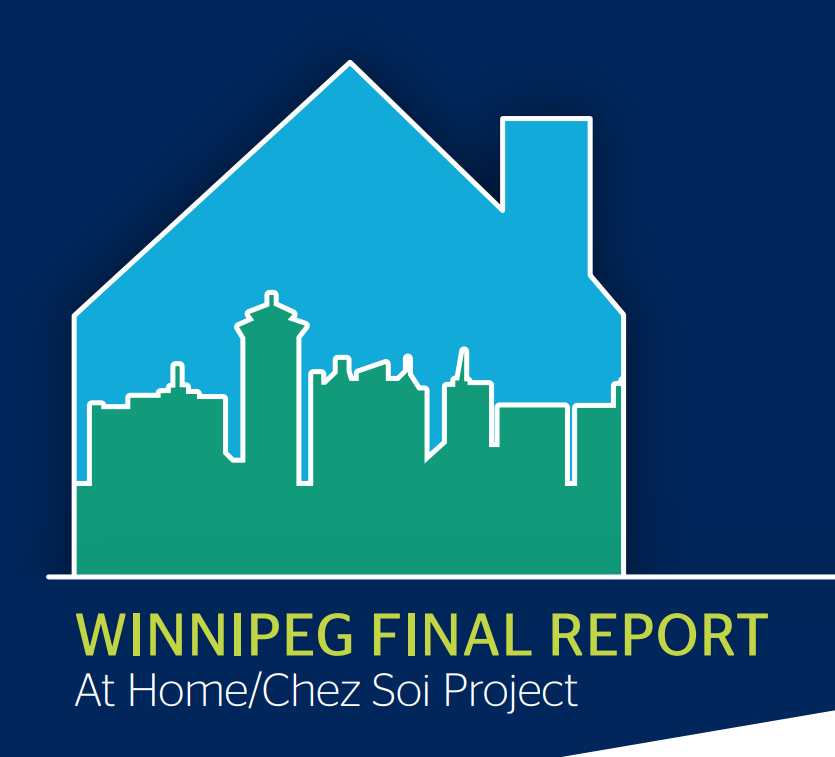If you are in distress, you can call or text 988 at any time. If it is an emergency, call 9-1-1 or go to your local emergency department.
- Reports, Research
Winnipeg Final Report: At Home/Chez Soi project
This report documents the final results of the At Home/Chez Soi Winnipeg site’s research demonstration project, which examined Housing First as a means of ending homelessness for people who are First Nations, Inuit and Metis and living with mental illness in urban settings. The project followed 513 participants for 2 years and compared Housing First to available local services. 1) Successful, culturally safe partnerships were developed and maintained among universities, local First Nations, Inuit, and Metis organizations, and government. Multiple key stakeholders were engaged in the development and ongoing operations of the Winnipeg site project from its inception. Its 3 community-based Housing First (HF) intervention teams included an Assertive Community Treatment (ACT) team for participants with high needs and 2 moderate need Intensive Case Management (ICM) teams — one serving Aboriginal participants (ICM AB) and a second, open ICM team with a range of participants (ICM-open) that included Aboriginal and non-Aboriginal persons. 2) Winnipeg study participants represent a distinct group. The participants for the service use and costing results reported here includes all of the ICM, ACT, and Treatment as Usual (TAU) groups in Winnipeg (N=513). 64% were male and 36% were female. 71% reported they were of First Nations, Inuit, and Metis descent. There are many indications that participants had multiple challenges in their lives that contributed to their disadvantaged status. For example, 69% did not complete high school. Most study participants were recruited from shelters or the streets, with 69% being absolutely homeless and 31% in precarious living situations. At entry, participants reported symptoms consistent with the presence of various mental illnesses, including concurrent disorders, such as substance-related problems (77%) and post-traumatic stress disorder (PTSD) (45%). Additionally, more than 99% of participants reported at least one physical health condition and 83% reported a traumatic brain injury. On average, our participants were exposed to 6 different categories of child abuse and/or neglect before the age of 18. Nearly half (49%) reported a history in foster care, 42% had parents who attended residential school, and 11% had attended residential school themselves. 3) Housing First was successfully implemented in Winnipeg in a manner faithful to the model, yet tailored to the local First Nations, Inuit, and Metis context. Involvement and engagement of the First Nations, Inuit, and Metis community and organizations occurred at all levels of the project’s implementation, delivery, and decision making. With knowledge of the legacy of colonialism and respect for Indigenous cultural practices, all service teams integrated a First Nations, Inuit, and Metis holistic approach in delivering Housing First to participants and elders, and traditional teachers were integrated as part of the services and programming offered to participants. At the same time, excellent research follow-up rates were achieved (81%) and outcomes clearly favour the Housing First approach in Winnipeg. In the last six months of the study, 45% of HF participants were housed all of the time, 28% some of the time, and 27% none of the time; whereas 29% of TAU participants were housed all of the time, 18% some of the time, and 52% none of the time. This finding is particularly noteworthy given the extremely low vacancy rate for rental housing in Winnipeg. Also, housing quality in a random sample of 84 participants was, on average, as good for HF residences as for TAU residences for those who got housing over the course of the study.This resource was published in 2014. The data may be out of date.
Main messages
- Reports, Research
Winnipeg Final Report: At Home/Chez Soi project
Winnipeg Final Report: At Home/Chez Soi project
- First Nations, Inuit and Métis, Housing and Homelessness
This report documents the final results of the At Home/Chez Soi Winnipeg site’s research demonstration project, which examined Housing First as a means of ending homelessness for people who are First Nations, Inuit and Metis and living with mental illness in urban settings. The project followed 513 participants for 2 years and compared Housing First to available local services. 1) Successful, culturally safe partnerships were developed and maintained among universities, local First Nations, Inuit, and Metis organizations, and government. Multiple key stakeholders were engaged in the development and ongoing operations of the Winnipeg site project from its inception. Its 3 community-based Housing First (HF) intervention teams included an Assertive Community Treatment (ACT) team for participants with high needs and 2 moderate need Intensive Case Management (ICM) teams — one serving Aboriginal participants (ICM AB) and a second, open ICM team with a range of participants (ICM-open) that included Aboriginal and non-Aboriginal persons. 2) Winnipeg study participants represent a distinct group. The participants for the service use and costing results reported here includes all of the ICM, ACT, and Treatment as Usual (TAU) groups in Winnipeg (N=513). 64% were male and 36% were female. 71% reported they were of First Nations, Inuit, and Metis descent. There are many indications that participants had multiple challenges in their lives that contributed to their disadvantaged status. For example, 69% did not complete high school. Most study participants were recruited from shelters or the streets, with 69% being absolutely homeless and 31% in precarious living situations. At entry, participants reported symptoms consistent with the presence of various mental illnesses, including concurrent disorders, such as substance-related problems (77%) and post-traumatic stress disorder (PTSD) (45%). Additionally, more than 99% of participants reported at least one physical health condition and 83% reported a traumatic brain injury. On average, our participants were exposed to 6 different categories of child abuse and/or neglect before the age of 18. Nearly half (49%) reported a history in foster care, 42% had parents who attended residential school, and 11% had attended residential school themselves. 3) Housing First was successfully implemented in Winnipeg in a manner faithful to the model, yet tailored to the local First Nations, Inuit, and Metis context. Involvement and engagement of the First Nations, Inuit, and Metis community and organizations occurred at all levels of the project’s implementation, delivery, and decision making. With knowledge of the legacy of colonialism and respect for Indigenous cultural practices, all service teams integrated a First Nations, Inuit, and Metis holistic approach in delivering Housing First to participants and elders, and traditional teachers were integrated as part of the services and programming offered to participants. At the same time, excellent research follow-up rates were achieved (81%) and outcomes clearly favour the Housing First approach in Winnipeg. In the last six months of the study, 45% of HF participants were housed all of the time, 28% some of the time, and 27% none of the time; whereas 29% of TAU participants were housed all of the time, 18% some of the time, and 52% none of the time. This finding is particularly noteworthy given the extremely low vacancy rate for rental housing in Winnipeg. Also, housing quality in a random sample of 84 participants was, on average, as good for HF residences as for TAU residences for those who got housing over the course of the study.
This resource was published in 2014. The data may be out of date.
Main messages
SHARE THIS PAGE
RELATED

Review our Assessment Framework for Mental Health Apps — a national framework containing key standards for safe, quality, and effective mental health apps in Canada.

To help expand the use of e-mental health services, we developed four online learning modules based on our Toolkit for E-Mental Health Implementation, in collaboration with the Centre for Addiction and Mental Health (CAMH).

Stepped Care 2.0© (SC2.0) is a transformative model for organizing and delivering evidence-informed mental health and substance use services.

